Paraphrasing Tool
Paraphrasing Tool in partnership with QuillBot. Paraphrase everywhere with the free Chrome Extension .
Try our other writing services


Avoid plagiarism in your paraphrased text
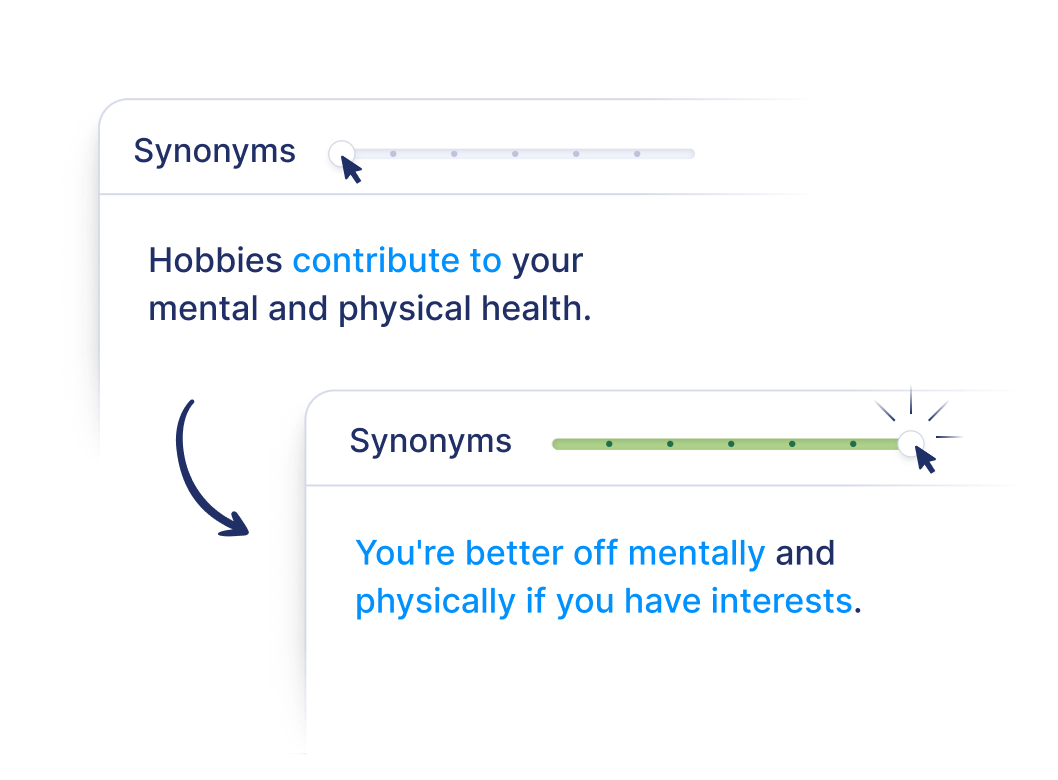
What is a paraphrasing tool?
This AI-powered paraphrasing tool lets you rewrite text in your own words. Use it to paraphrase articles, essays, and other pieces of text. You can also use it to rephrase sentences and find synonyms for individual words. And the best part? It’s all 100% free!
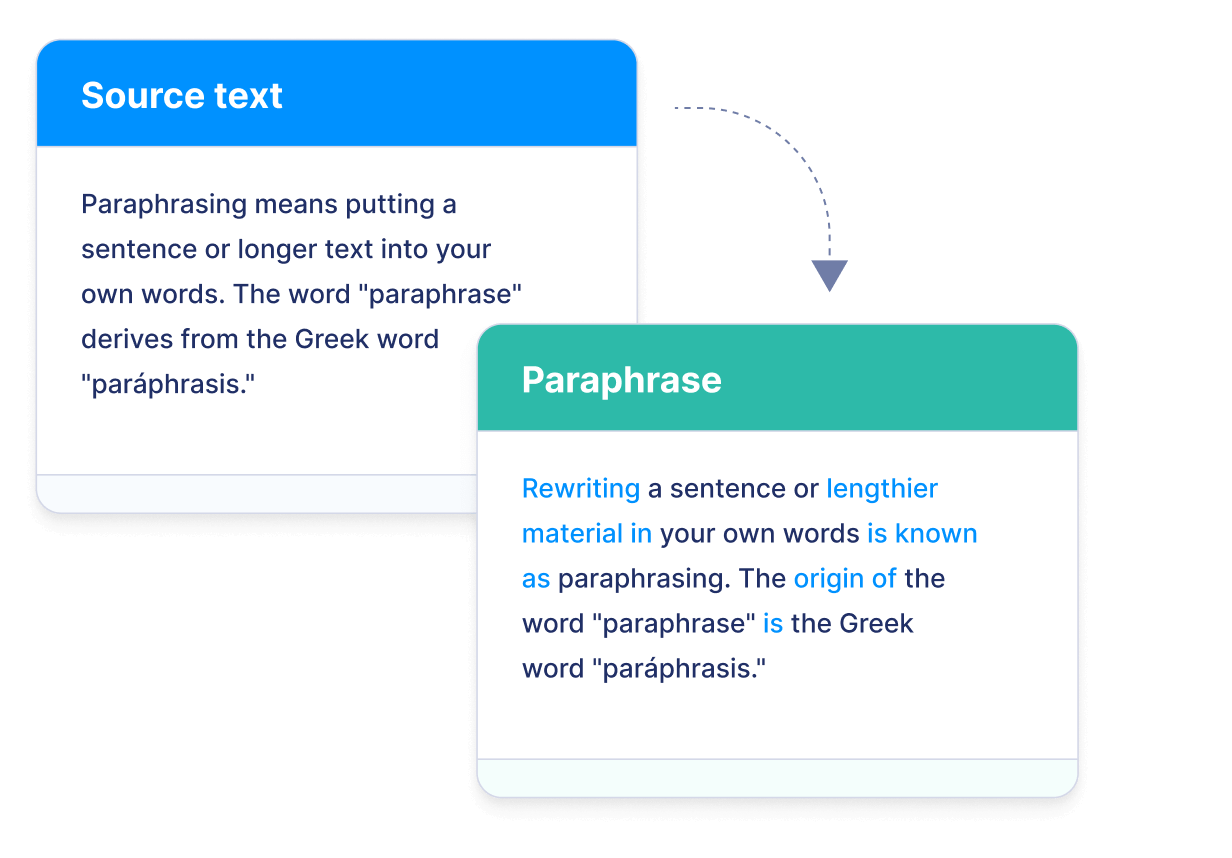
What is paraphrasing?
Paraphrasing involves expressing someone else’s ideas or thoughts in your own words while maintaining the original meaning. Paraphrasing tools can help you quickly reword text by replacing certain words with synonyms or restructuring sentences. They can also make your text more concise, clear, and suitable for a specific audience. Paraphrasing is an essential skill in academic writing and professional communication.

Why use this paraphrasing tool?
- Save time: Gone are the days when you had to reword sentences yourself; now you can rewrite an individual sentence or a complete text with one click.
- Improve your writing: Your writing will always be clear and easy to understand. Automatically ensure consistent language throughout.
- Preserve original meaning: Paraphrase without fear of losing the point of your text.
- No annoying ads: We care about the user experience, so we don’t run any ads.
- Accurate: Reliable and grammatically correct paraphrasing.
- No sign-up required: We don’t need your data for you to use our paraphrasing tool.
- Super simple to use: A simple interface even your grandma could use.
- It’s 100% free: No hidden costs, just unlimited use of a free paraphrasing tool.
People are in love with our paraphrasing tool

No Signup Needed
You don’t have to register or sign up. Insert your text and get started right away.

The Paraphraser is Ad-Free
Don’t wait for ads or distractions. The paraphrasing tool is ad-free!
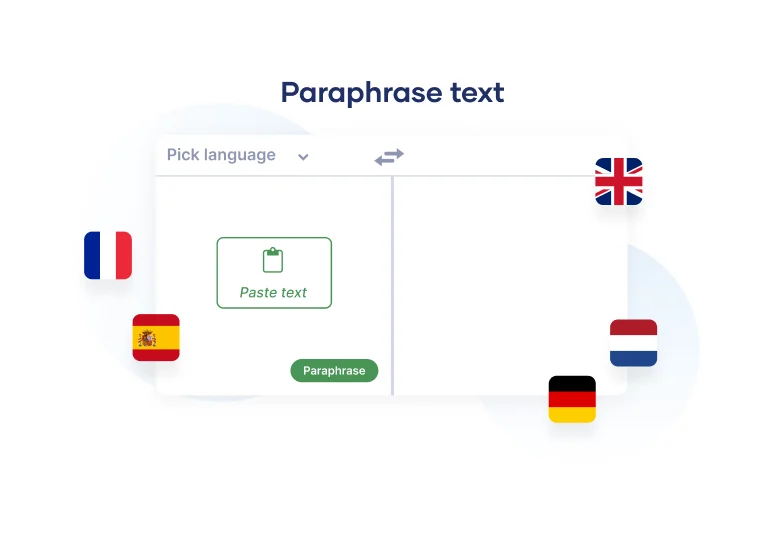
Multi-lingual
Use our paraphraser for texts in different languages.
Features of the paraphrasing tool

Rephrase individual sentences
With the Scribbr Paraphrasing Tool, you can easily reformulate individual sentences.
- Write varied headlines
- Rephrase the subject line of an email
- Create unique image captions
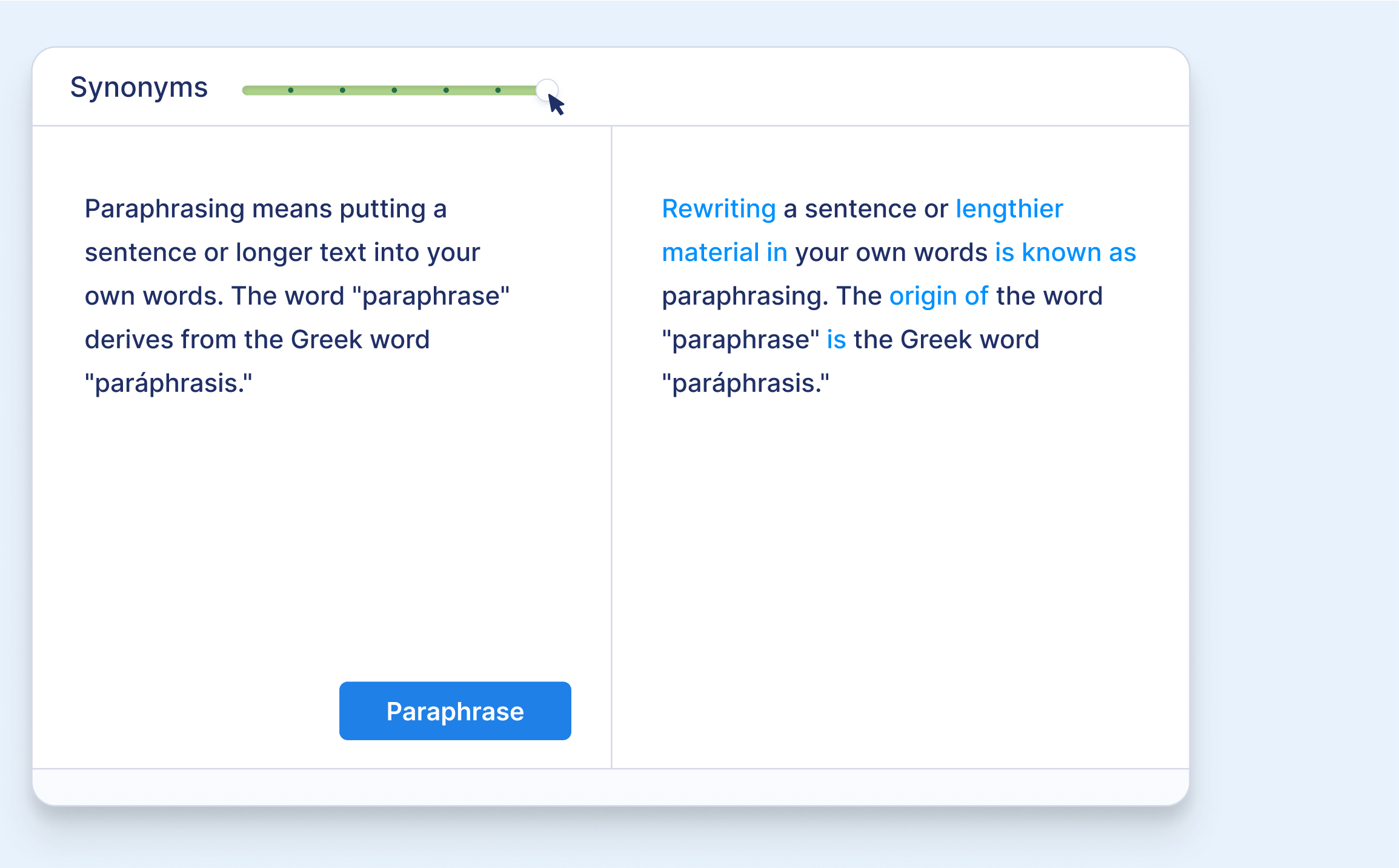
Paraphrase a whole text
Our paraphraser can also help with longer passages (up to 125 words per input). Upload your document or copy your text into the input field.
With one click, you can reformulate the entire text.

Find synonyms with ease
Simply click on any word to open the interactive thesaurus.
- Choose from a list of suggested synonyms
- Find the synonym with the most appropriate meaning
- Replace the word with a single click
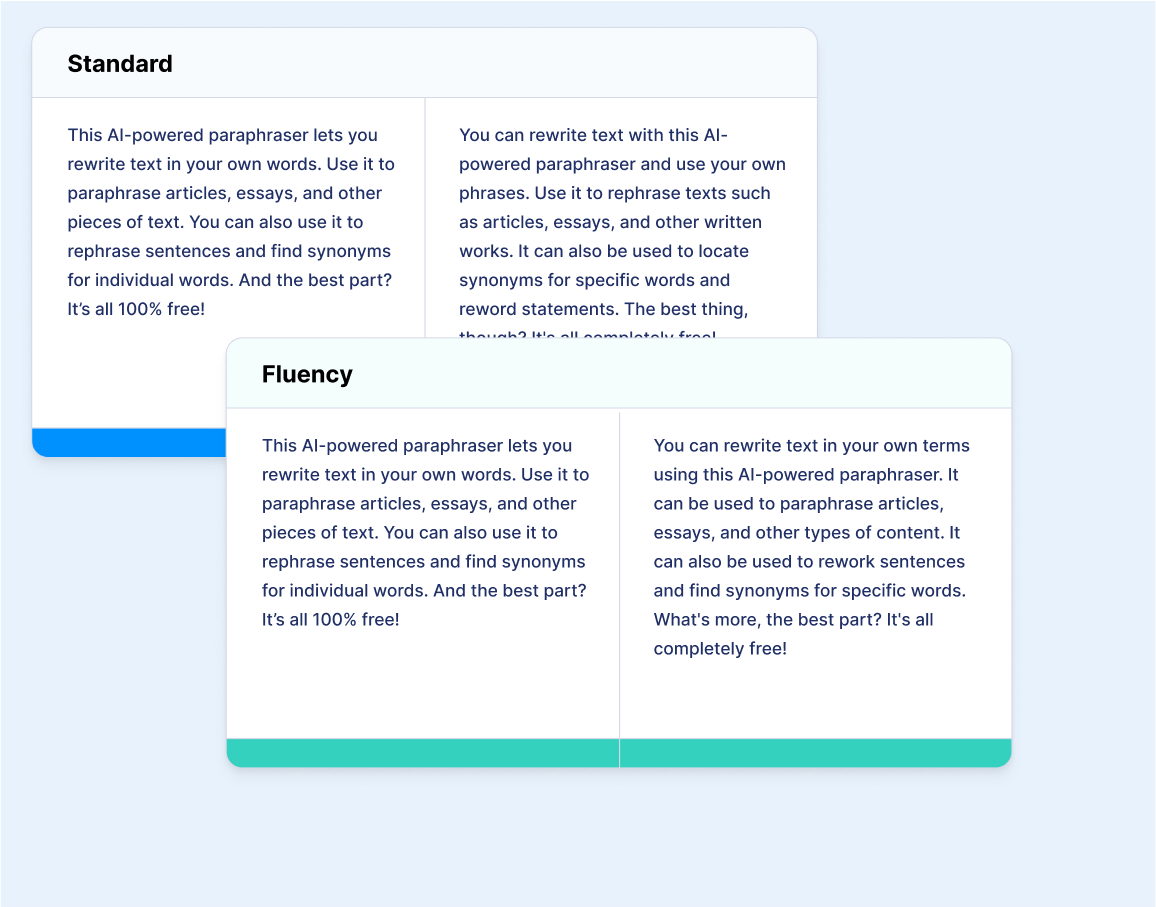
Paraphrase in two ways
- Standard: Offers a compromise between modifying and preserving the meaning of the original text
- Fluency: Improves language and corrects grammatical mistakes
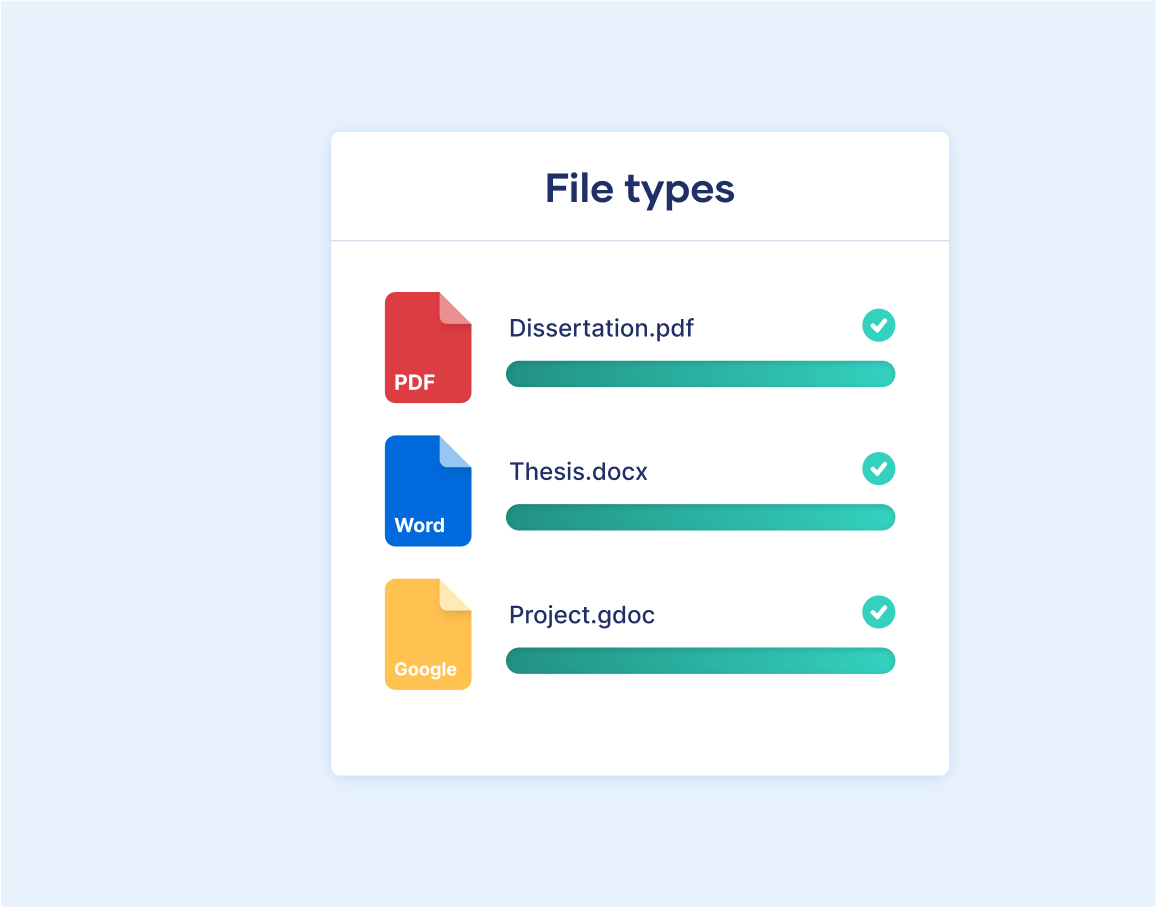
Upload different types of documents
Upload any Microsoft Word document, Google Doc, or PDF into the paraphrasing tool.
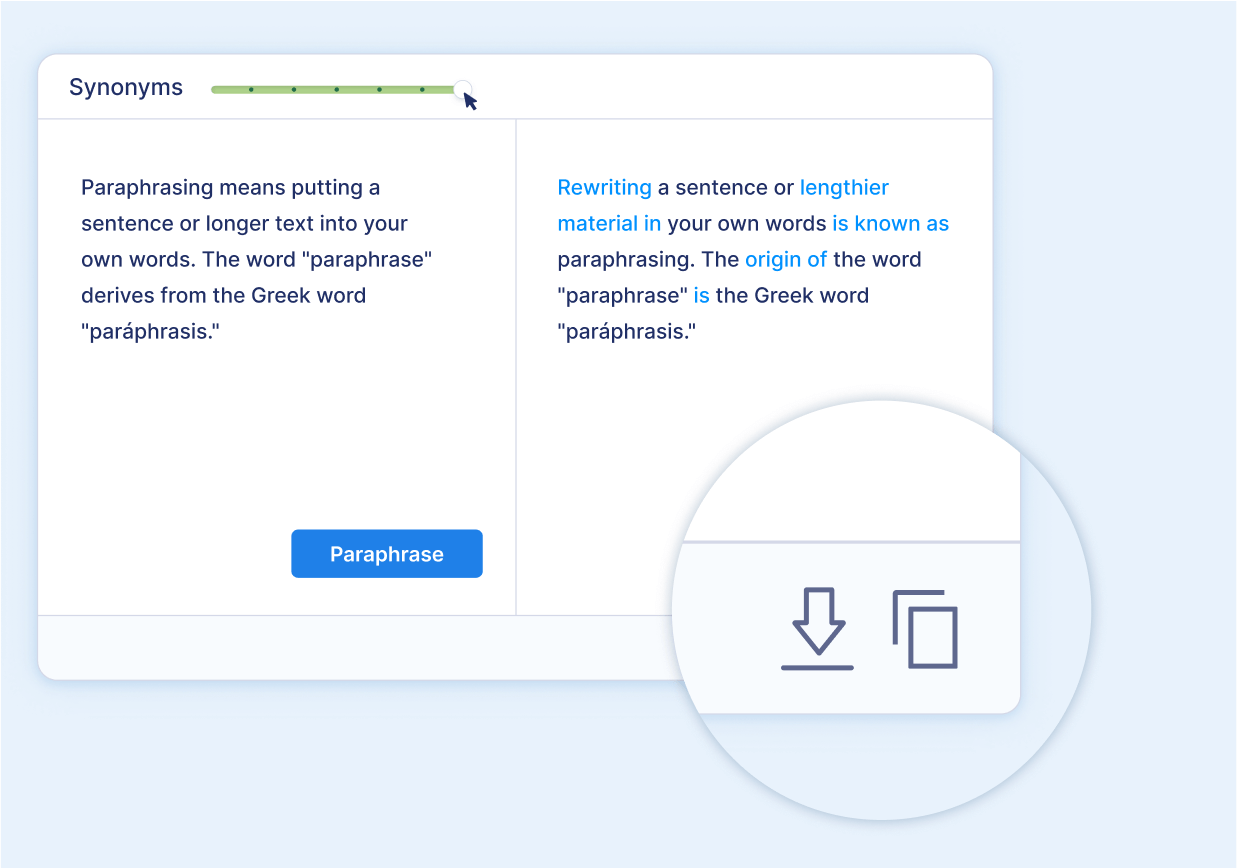
Download or copy your results
After you’re done, you can easily download or copy your text to use somewhere else.

Powered by AI
The paraphrasing tool uses natural language processing to rewrite any text you give it. This way, you can paraphrase any text within seconds.
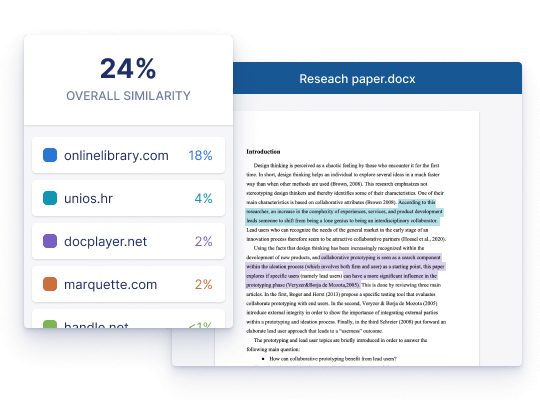
Avoid accidental plagiarism
Want to make sure your document is plagiarism-free? In addition to our paraphrasing tool, which will help you rephrase sentences, quotations, or paragraphs correctly, you can also use our anti-plagiarism software to make sure your document is unique and not plagiarized.
Scribbr’s anti-plagiarism software enables you to:
- Detect plagiarism more accurately than other tools
- Ensure that your paraphrased text is valid
- Highlight the sources that are most similar to your text
Start for free
How does this paraphrasing tool work?
1. put your text into the paraphraser, 2. select your method of paraphrasing, 3. select the quantity of synonyms you want, 4. edit your text where needed, who can use this paraphrasing tool.

Paraphrasing tools can help students to understand texts and improve the quality of their writing.
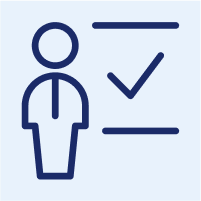
Create original lesson plans, presentations, or other educational materials.

Researchers
Explain complex concepts or ideas to a wider audience.

Journalists
Quickly and easily rephrase text to avoid repetitive language.

Copywriters
By using a paraphrasing tool, you can quickly and easily rework existing content to create something new and unique.

Bloggers can rewrite existing content to make it their own.

Writers who need to rewrite content, such as adapting an article for a different context or writing content for a different audience.

A paraphrasing tool lets you quickly rewrite your original content for each medium, ensuring you reach the right audience on each platform.
The all-purpose paraphrasing tool
The Scribbr Paraphrasing Tool is the perfect assistant in a variety of contexts.

Brainstorming
Writer’s block? Use our paraphraser to get some inspiration.

Professional communication
Produce creative headings for your blog posts or PowerPoint slides.

Academic writing
Paraphrase sources smoothly in your thesis or research paper.

Social media
Craft memorable captions and content for your social media posts.
Paraphrase text online, for free
The Scribbr Paraphrasing Tool lets you rewrite as many sentences as you want—for free.
| 💶 100% free | Rephrase as many texts as you want |
|---|---|
| 🟢 No login | No registration needed |
| 📜 Sentences & paragraphs | Suitable for individual sentences or whole paragraphs |
| 🖍️ Choice of writing styles | For school, university, or work |
| ⭐️ Rating | based on 13,322 reviews |
Write with 100% confidence 👉
Scribbr & academic integrity.
Scribbr is committed to protecting academic integrity. Our plagiarism checker , AI Detector , Citation Generator , proofreading services , paraphrasing tool, grammar checker , summarizer , and free Knowledge Base content are designed to help students produce quality academic papers.
Ask our team
Want to contact us directly? No problem. We are always here for you.
- Email [email protected]
- Start live chat
- Call +1 (510) 822-8066
- WhatsApp +31 20 261 6040

Frequently asked questions
The act of putting someone else’s ideas or words into your own words is called paraphrasing, rephrasing, or rewording. Even though they are often used interchangeably, the terms can mean slightly different things:
Paraphrasing is restating someone else’s ideas or words in your own words while retaining their meaning. Paraphrasing changes sentence structure, word choice, and sentence length to convey the same meaning.
Rephrasing may involve more substantial changes to the original text, including changing the order of sentences or the overall structure of the text.
Rewording is changing individual words in a text without changing its meaning or structure, often using synonyms.
It can. One of the two methods of paraphrasing is called “Fluency.” This will improve the language and fix grammatical errors in the text you’re paraphrasing.
Paraphrasing and using a paraphrasing tool aren’t cheating. It’s a great tool for saving time and coming up with new ways to express yourself in writing. However, always be sure to credit your sources. Avoid plagiarism.
If you don’t properly cite text paraphrased from another source, you’re plagiarizing. If you use someone else’s text and paraphrase it, you need to credit the original source. You can do that by using citations. There are different styles, like APA, MLA, Harvard, and Chicago. Find more information about citing sources here.
Paraphrasing without crediting the original author is a form of plagiarism , because you’re presenting someone else’s ideas as if they were your own.
However, paraphrasing is not plagiarism if you correctly cite the source . This means including an in-text citation and a full reference, formatted according to your required citation style .
As well as citing, make sure that any paraphrased text is completely rewritten in your own words.
Plagiarism means using someone else’s words or ideas and passing them off as your own. Paraphrasing means putting someone else’s ideas in your own words.
So when does paraphrasing count as plagiarism?
- Paraphrasing is plagiarism if you don’t properly credit the original author.
- Paraphrasing is plagiarism if your text is too close to the original wording (even if you cite the source). If you directly copy a sentence or phrase, you should quote it instead.
- Paraphrasing is not plagiarism if you put the author’s ideas completely in your own words and properly cite the source .
Try our services
- More from M-W
- To save this word, you'll need to log in. Log In
Definition of paraphrase
(Entry 1 of 2)
Definition of paraphrase (Entry 2 of 2)
intransitive verb
transitive verb
Did you know?
When we paraphrase, we provide a version that can exist beside the original (rather than replace it). We paraphrase all the time. When you tell a friend what someone else has said, you're almost always paraphrasing, since you're not repeating the exact words. If you go to hear a talk, you might paraphrase the speaker's main points afterward for your friends. And when writing a paper on a short story, you might start off your essay with a paraphrase of the plot. Paraphrasing is especially useful when dealing with poetry, since poetic language is often difficult and poems may have meanings that are hard to pin down.
- restatement
- translating
- translation
Examples of paraphrase in a Sentence
These examples are programmatically compiled from various online sources to illustrate current usage of the word 'paraphrase.' Any opinions expressed in the examples do not represent those of Merriam-Webster or its editors. Send us feedback about these examples.
Word History
Noun and Verb
Middle French, from Latin paraphrasis , from Greek, from paraphrazein to paraphrase, from para- + phrazein to point out
1548, in the meaning defined at sense 1
1598, in the meaning defined at transitive sense
Articles Related to paraphrase

The Words of the Week - Jan. 5
Dictionary lookups from Europe, higher education, and the new year
Dictionary Entries Near paraphrase
paraphrasis
Cite this Entry
“Paraphrase.” Merriam-Webster.com Dictionary , Merriam-Webster, https://www.merriam-webster.com/dictionary/paraphrase. Accessed 6 Jul. 2024.
Kids Definition
Kids definition of paraphrase.
Kids Definition of paraphrase (Entry 2 of 2)
More from Merriam-Webster on paraphrase
Nglish: Translation of paraphrase for Spanish Speakers
Britannica English: Translation of paraphrase for Arabic Speakers
Britannica.com: Encyclopedia article about paraphrase
Subscribe to America's largest dictionary and get thousands more definitions and advanced search—ad free!

Can you solve 4 words at once?
Word of the day.
See Definitions and Examples »
Get Word of the Day daily email!
Popular in Grammar & Usage
Plural and possessive names: a guide, commonly misspelled words, how to use em dashes (—), en dashes (–) , and hyphens (-), absent letters that are heard anyway, how to use accents and diacritical marks, popular in wordplay, it's a scorcher words for the summer heat, flower etymologies for your spring garden, 12 star wars words, 'swash', 'praya', and 12 more beachy words, 8 words for lesser-known musical instruments, games & quizzes.

Advanced Paraphrasing Tool
Elevate your writing with our free and ai-powered paraphraser. instantly correct or rephrase your sentences in different tones., paraphrasing tool, please rewrite my sentence, what is paraphrasing.
Paraphrasing is the art of rewriting text into other words. This includes using synonyms, restructuring phrases, and connecting ideas in different ways. A state-of-the-art paraphraser provides automatic and simple-to-use rephrasing of complete sentences.
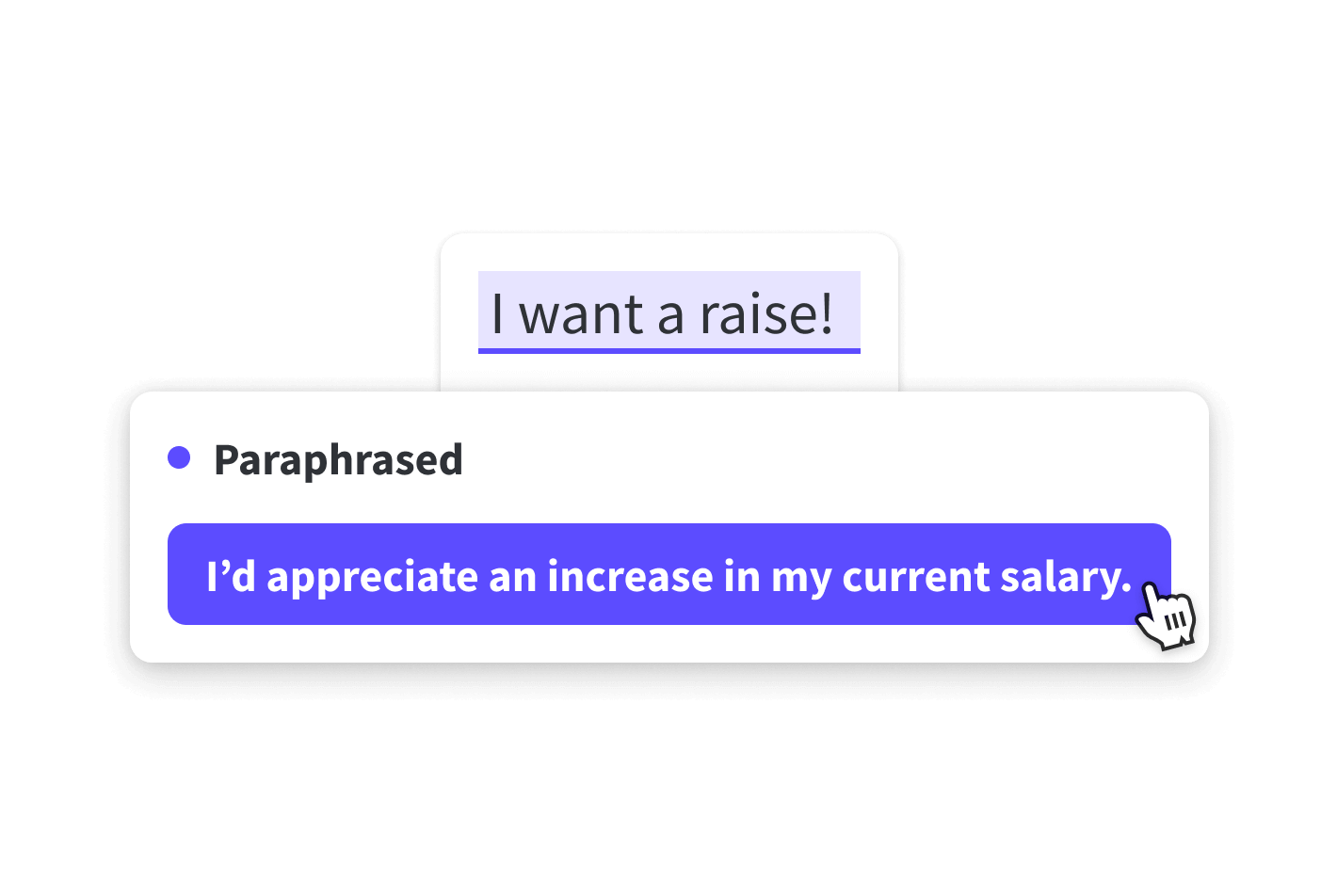
Why Should I Paraphrase My Sentences?
By paraphrasing existing sentences, you can elevate your writing and achieve different goals as a writer. That’s why rephrasing is helpful in plenty of cases: rewriting citations, strengthening the message of your text, and rewording your ideas while improving style.
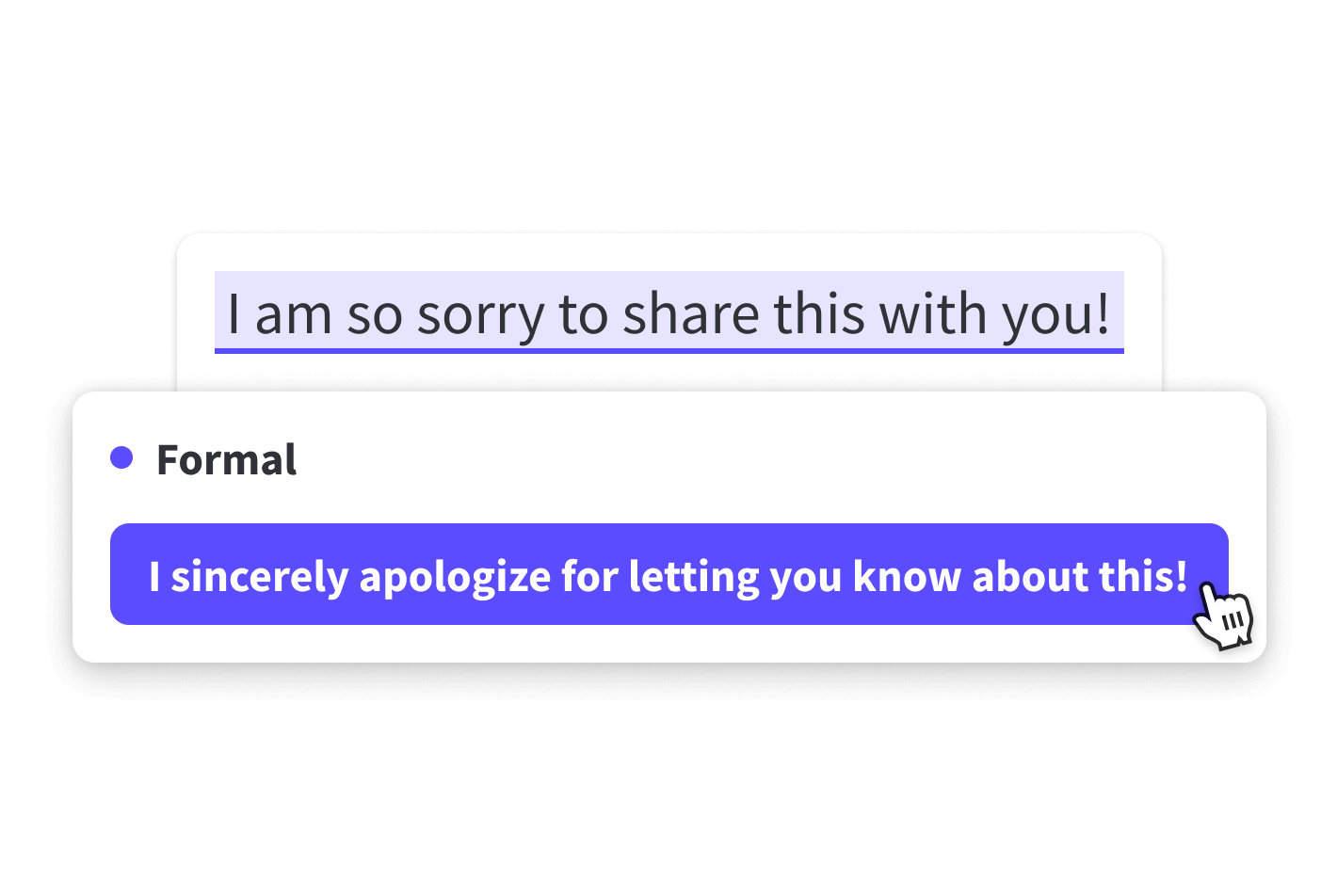
How Does Rephrasing Help Me Become a Better Writer?
This feature is highly customizable, meaning you’re in control. Choose from five different categories—general, formal, concise, fluent, or simple—to transform your writing to better suit the context and tone. Paraphrasing helps you by refining and perfecting your masterpieces.
Where Can I Use the Paraphrasing Tool?
Rephrasing is available wherever and whenever! All you need is a LanguageTool account and a stable internet connection to rewrite your sentences in almost all of LanguageTool's extensions. The feature is easily accessible for everyone that aims to improve their writing.
Thunderbird
What exactly does an online paraphraser do.
LanguageTool’s paraphrasing feature does so much more than just rewrite sentences. Not only does it check for stronger, more suitable word choice, but it also corrects your sentence as a whole to ensure high-quality writing. With its intuitive and user-friendly interface, everyone can leverage Artificial Intelligence to achieve the best results possible.
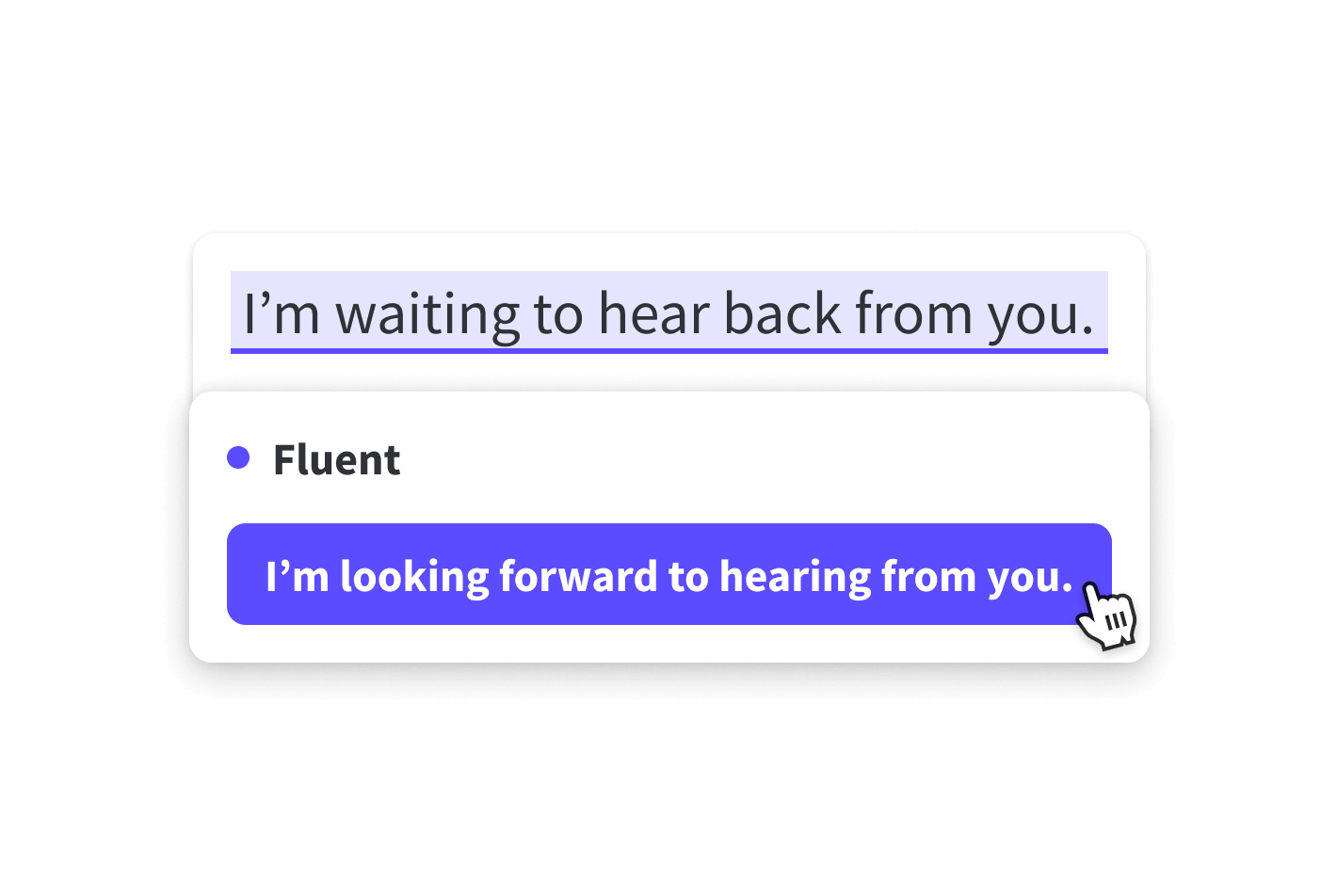
What Other Features Does LanguageTool’s Paraphraser Provide?
The best part of using A.I. to paraphrase your writing is that the suggested sentences come free of spelling, grammar, and punctuation errors. Want to also improve style? Simply go back to the general correction to view stylistic suggestions.
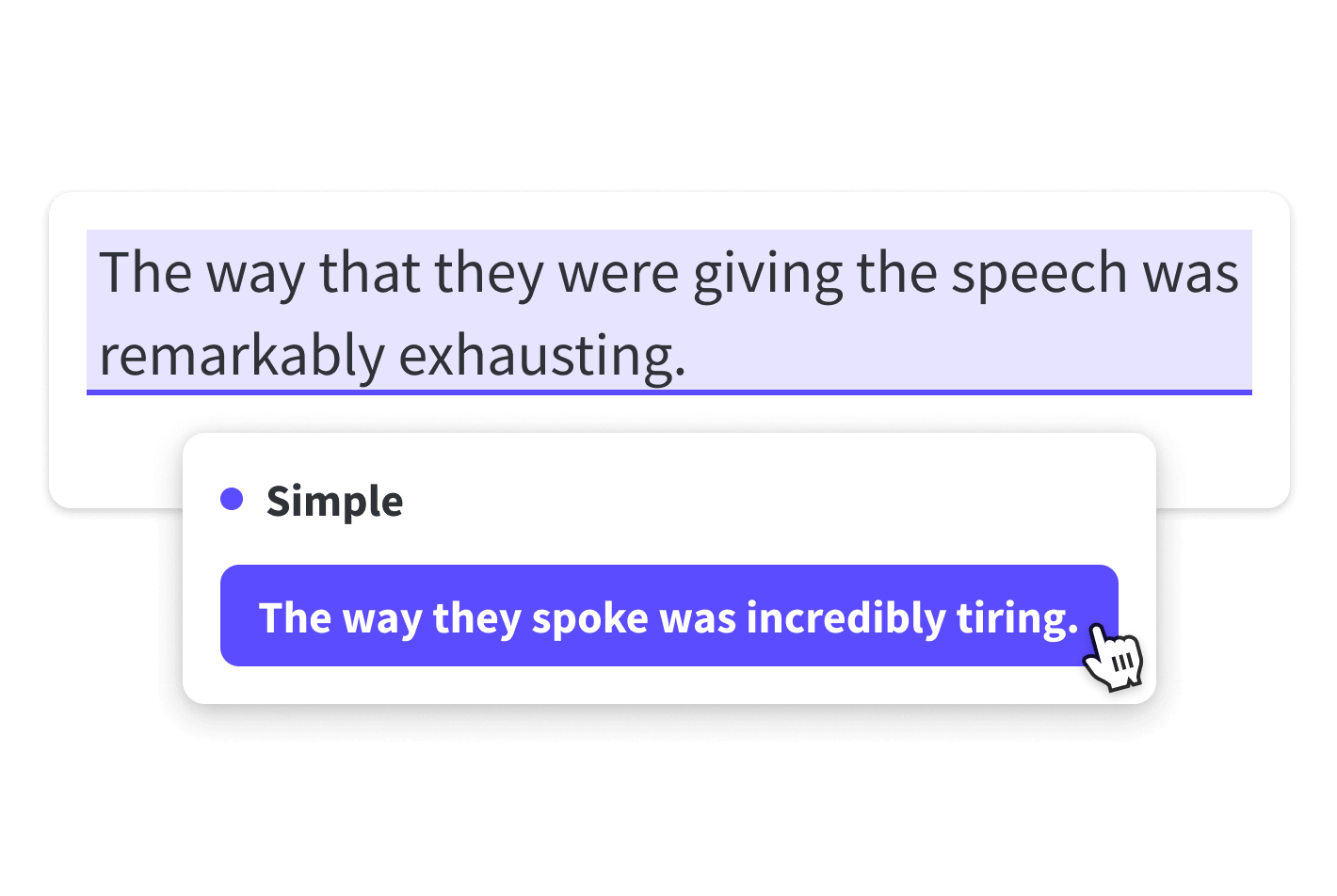
As multilingual as you
Make your text sound professional and avoid embarrassing style, punctuation, and grammar mistakes
It’s an online tool that rewrites texts in a new (stylistically different) way by using alternative wording and a rephrased sentence structure.
This function is recommended for all types of texts, including professional, academic, and creative writing. It’s available for all LanguageTool users, but unlimited paraphrasing is only available in Premium.
A paraphrasing tool can easily enhance your writing by improving the tone and style of your text. Moreover, it helps you avoid having to write direct citations by rewriting copy-and-pasted text.
Premium accounts offer even more useful and powerful features:
Only with Premium
Sentence correction of longer texts
Style guide for customizing individual rules
Team features for companies
More in-depth suggestions, especially for word choice and style
How Can I Effectively Use the Rephrasing Tool?
For basic users, the paraphrasing feature is limited to three times daily. If you need more rephrased sentences, you can upgrade to LanguageTool Premium to get access to unlimited paraphrasing in six languages and several English dialects. Remember: No personal data is stored (ever) and privacy guidelines are strictly followed (always).
Strengthen Your Communication Skills
Try out the best paraphrasing tool for free and discover how LanguageTool can elevate your writing.
Welcome back! Please log in to continue.
Don't have an account? Sign up
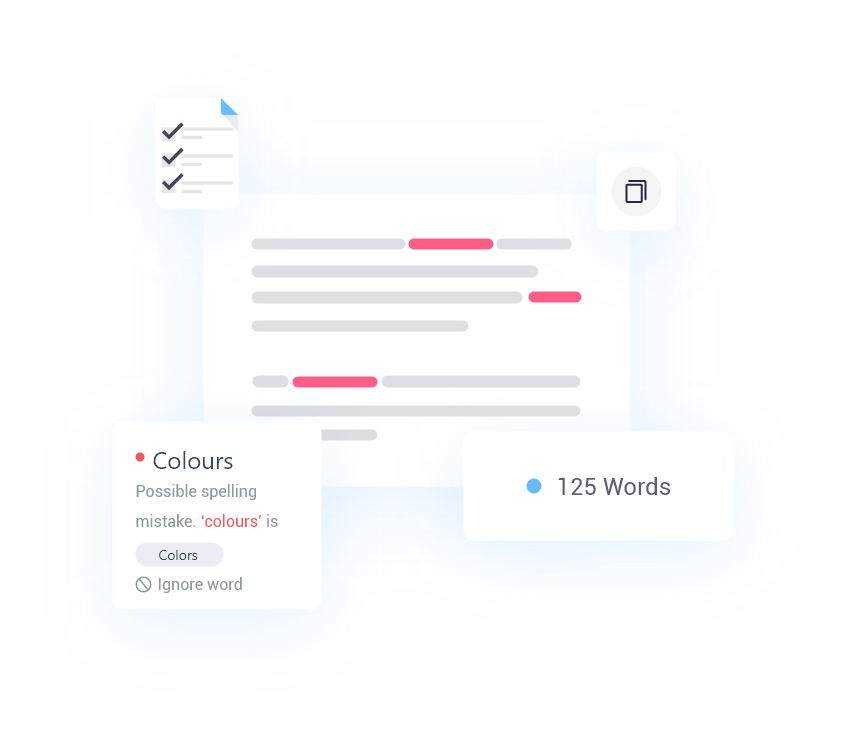
© 2024 All Rights Reserved
Join us! To Unlock the Power of AI.
Already have an account? Log in
Give Feedback
How was your experience with this tool let us know?
Thanks for sharing your amazing feedback
Paraphrase Online

Paraphrase online is a free online paraphrasing tool used to change words and rephrase sentences.
How to Use our Paraphrasing Tool?
It is very easy to paraphrase online with our paraphrasing tool. To rephrase, follow the steps below.
- Type/paste the text into the input box or upload a file (.doc, .docx, .pdf, .txt) from local storage.
- Select the required paraphrasing mode and click on the "Paraphrase" button.
- The paraphrased text will be displayed on the right box. You can also change the modes for different outputs.
- You can also copy and download the paraphrased text by clicking on the output buttons.
Free Paraphrasing Tool
Our paraphrasing tool (paraphraser) helps students, writers, and bloggers to avoid plagiarism. This rewording tool uses advanced AI algorithms to change sentence structure, synonymize the text and make other similar changes.
This word changer has a built-in paraphrase generator that helps in rephrasing any paragraph accurately.
What is Paraphrasing?
Paraphrasing is one way to use a text in your own writing without directly quoting source material ( according to Purdue University ). It is the process of rewording and rearranging sentence structure while keeping the original meaning of the context.
Features of Paraphrase Online
Paraphrase Online offers numerous features such as paraphrasing essays, assignments, and rewording articles. Our paraphrase tool works as the best sentence rephraser and word changer.
Upload Files
You can use this feature to upload files directly from your device and skip the copy-paste or typing step. Our tool supports Doc, Docx, PDF & .txt file formats.
Free and Secure
Our word paraphraser is 100% free and completely secure to use for all kinds of rephrasing paragraphs and sentences to avoid plagiarism.
Rephrase Accurately
Our rephrase tool is based on advanced AI algorithms that can rephrase more accurately than humans and makes text grammatically correct and plagiarism free.
Ease to use
Paraphrase Online has a user-friendly interface and simple navigation that makes our paraphrase generator the most easy to use paraphrasing tool online.
Plagiarism Free Content
Content paraphrased by our sentence rephraser will be 100% plagiarism-free. Our paraphrasing tool helps you rephrase any text in seconds to avoid plagiarism issues.
Speed & Customization
Our paraphraser can rephrase any text within seconds and provides quick results. Paraphrase Online also allows you to customize the output to suit your needs, e.g: choosing the specific words to be replaced.
05 Different Paraphrasing Modes
Our paraphrasing tool offers five different paraphrasing modes/styles that you can choose from as per your need and requirement. Here is a brief profile of each mode:
Word Changer
The Word Changer mode is designed to replace the words in the text with suitable synonyms. This mode focuses on changing words and does not make other types of alterations.
Sentence Rephraser
The Sentence Rephraser mode is made to rephrase sentences as a whole by making changes to the words as well as the phrases.
The Academic mode of our paraphrasing tool makes your text more formal and suitable for academic uses.
The Creative mode makes smart and extensive changes to the text to make it look different from the original version. This mode is best for avoiding plagiarism, improving readability, and enhancing engagement.
The Shorten mode rephrases text while also making it shorter than the original input. This mode is best for creating a paraphrased + summarized output for your existing text.
Why Our Paraphrase Tool?
Our paraphrase tool is the best rewording tool that helps you to write content in your own words. This paraphrase generator changes words and phrases quickly and accurately.
Supported Languages
ES , ID , BR
| 🌪️ Quickly Paraphrase | Sentences & Paragraphs |
| 🥇 Paraphrasing Styles | 05 AI Modes |
| 📝 Improves | Writing style, Word choice & Vocabulary |
| 😍 Write Unique | Assignments & Essays |
| 💰 Pricing | 100% Free |
Users of Paraphrase Online
This paraphraser is widely used by:
Students can use this paraphrasing tool to paraphrase their assignments and research papers. Our tool can help students:
Avoid plagiarism : It helps students to make their work plagiarism-free.
Make assignments more readable : Our tool also makes content more readable and free of grammar errors. And if English is not their first language then this tool is no less than a best friend.
- Save time : Generate assignments and essays by quickly paraphrasing the existing content.
Creating class notes and study material on the same topic is a very tough task for teachers. Hey teachers! You can thank us for this awesome rewording tool. You can:
- Paraphrase any notes within seconds while keeping its original meaning;
- Make study notes easy to understand for your class students;
- Generate new assignment ideas by rephrasing the same topics.
Webmasters/Bloggers
Bloggers have to post on a regular basis, and mostly on similar topics. They can create unique content for their blogs without spending a lot of time by just rewording existing blogs.
SEO Specialists
SEO specialists can use our AI-based paraphrasing tool to create unique content for their websites. SEO experts must use our tool because:
- The final result of our tool is also optimized for search engines;
- It adjusts multiple keywords by rephrasing text
Content Writers
Content writers play the most creative part in a website. Our rephrase tool helps them to come up with new ideas using existing content. Content writers can also use our paraphrase tool to rephrase their write-ups to avoid plagiarism.

Copywriters
Make your next advertising campaign line catchy and engaging using our paraphrasing tool. Create messages that will sell products, services, or ideas. Paraphrase Online makes your writing visually appealing and effective.
Media Marketers
Best marketing lines matter in digital marketing. Our paraphrase tool provides different versions of the same lines that can be used for A/B testing. Even a simple choice of different words can generate more leads.
Researchers
Researchers can use our shorten mode to summarize and paraphrase their research papers. It makes it easy for them to change their literature reviews.
Business Professionals
Rewording emails, reports, or other business documents is very common for business professionals. Our reword tool could be very helpful in rewording texts for better clarity.
Frequently Asked Questions
Is using an online paraphrasing tool illegal.
No, using an online paraphrasing tool is not illegal. If you want to paraphrase someone else’s content, be sure to cite the source to avoid plagiarism.
Why is paraphrasing important?
Paraphrasing is important as it lets you avoid plagiarism and make your content more easily understandable. Paraphrasing is often done to improve clarity in a piece of text.
Which paraphrasing tool is best for university students?
The paraphrasing tool by Paraphrase Online is an excellent choice for university students. It is free and provides accurate results.
How can I use paraphrase tool for research paper?
You can easily use our paraphrase tool for improving the quality of your research papers and for getting new/better ideas for them. Using Paraphrase Online is easy and simple. You just have to enter your text, choose a mode, and then click on the button.
What are the benefits of paraphrasing in communication?
Paraphrasing can help make communication easier and more clear. You can paraphrase your mails and messages to make them more readable, natural, and better-flowing.
Paraphrasing in communication examples:
- You can paraphrase your work emails to make sure that the recipient easily understands them.
- You can paraphrase your letters and memos to make them clear and understandable for the office people.
- You can also paraphrase simple text messages to avoid having to repeat or explain yourself afterward.

- Literary Terms
- Definition & Examples
- When & How to Use Paraphrase
I. What is a Paraphrase?
A paraphrase (pronounced par – uh -freyz) is a restatement or rewording of a paragraph or text, in order to borrow, clarify, or expand on information without plagiarizing. Paraphrasing is an important tool to use when writing research papers, essays , and pieces of journalism.
II. Examples of Paraphrasing
For examples of paraphrasing, consider these possible re-wordings of the same statement:
She angered me with her inappropriate comments, rumor-spreading, and disrespectfulness at the formal dinner table.
She made me angry when she was rude at dinner.
This paraphrase is an example of a rewording which shortens and simplifies while maintaining the same meaning.
Her impoliteness, gossiping, and general lack of respect at dinner infuriated me.
This rephrasing maintains the same meaning but is rearranged in a creative way.
I was mad when she started spreading rumors, making inappropriate comments, and disrespecting other guests at our dinner.
Another paraphrase, this rewording properly and interestingly rearranges the information provided in the original sentence.
III. Types of Paraphrasing
A. change of parts of speech.
Parts of speech ranging from verbs and nouns to adjectives and adverbs are replaced with new parts of speech in this type of paraphrasing. Here is an example:
Original Sentence:
The boy quickly ran across the finish line, seizing yet another victory.
Paraphrase:
The quick boy seized yet another victory when he ran across the finish line.
In this example, many parts of speech are changed: the adverb quickly becomes the adjective quick, and the verb phrase with the gerund seizing becomes the verb seized.
B. Change of Structure
This type of paraphrasing involves changing the sentence’s structure, sometimes creating a passive voice from an active voice and vice versa. The change in structure can be used to reflect the writer’s interpretation of the original quote. Here is an example of change of structure paraphrasing:
Puppies were adopted by numerous kind souls at the puppy drive.
Many kind souls adopted puppies during the puppy drive.
In this example, the object of the sentence (kind souls) becomes the subject with an active voice (adopted) rather than a passive voice (were adopted).
C. Reduction of Clauses
Reduction of clauses paraphrases reduce the number of clauses in a sentence, which can be interruptive or confusing, by incorporating the phrases into the sentence. Here is an example of reduction of clauses paraphrasing:
While I understand where you’re coming from, and truly respect your opinion, I wish you would express yourself more clearly, like Clara does.
I understand where you’re coming from and respect your opinion, but I wish you would be more like Clara and express yourself more clearly.
D. Synonym Replacement
Synonym replacement paraphrasing is one of the simplest forms of paraphrasing: replacing words with similar words, or synonyms. Here is an example:
The older citizens were honored with a parade for those once in the military.
Senior citizens were honored with a march for veterans.
In this example, many synonyms are used: older citizens are senior citizens, a parade becomes a march, and those once in the military refers to veterans.
IV. The Importance of Using Paraphrase
Paraphrasing is a way of referencing a source without directly quoting it or of further explaining a selected quote. Correct paraphrasing is important in that poor paraphrasing can result in accusations of plagiarism, or copying from a source without correctly citing it. Paraphrasing allows writers to examine the meaning of others’ work, creatively rephrase their statements, and craft information to suit an essay or composition’s goal or focus.
V. Paraphrase in Literature
Paraphrasing can be found in a variety of journalistic sources from newspapers to film documentaries to literary journals. Here are a few examples of paraphrasing in literature:
Someone once wrote that musicians are touched on the shoulder by God, and I think it’s true. You can make other people happy with music, but you can make yourself happy too.
In John Berendt’s nonfiction novel Midnight in the Garden of Good and Evil , a character references what someone has once written by paraphrasing their message.
I’m going to paraphrase Thoreau here… rather than love, than money, than faith, than fame, than fairness… give me truth.
In this example from the nonfiction novel Into the Wild , Jon Krakauer paraphrases Thoreau’s larger message of transcendence.
So far, Laurance’s critiques of new road-building schemes have been well received, but he expects that to change.
In Michelle Nijhuis’ article “What Roads Have Wrought,” William Laurance is paraphrased rather than quoted to express his general viewpoint.
VI. Paraphrase in Pop Culture
Paraphrasing is often found in pop culture when attempting to translate the language of older plays, poems, and stories, such as Shakespeare’s works. Here are a few examples of paraphrasing in pop culture:
10 Things I Hate About You (1999):
Just a minor encounter with the shrew… the mewling, rampalian wretch herself.
In the modern-day adaptation of Shakespeare’s The Taming of the Shrew , many characters ’ lines paraphrase Shakespeare’s originals. Here is Shakespeare’s version:
A meacock wretch can make the curstest shrew.
A Different World: Romeo, Oh Romeo
First, the student reads Shakespeare’s original words:
Oh gentle Romeo. If thou dost love, pronounce it faithfully. Or if thou thinkest I’m too quickly won, I’ll frown and be perverse and say thee nay, so thou wilt woo.
Then, she paraphrases to translate its meaning for modern ears:
It’s all about translation. Oh, sweet thang Romeo. If you think I’m all that, then step to me correctly. But if you think I’m a skeeze, I’ll be dissin’ and dismissin’, then you’ll be workin’ overtime getting’ me back.
VII. Related Terms
Like paraphrases, summaries are rewordings of original statements. Whereas paraphrases are precise and specific, summaries are brief and selective. Summaries report main points in a shortened version of the original, whereas paraphrases simply restate the original statement in a new way. Here is an example of summary versus paraphrase:
Original Statement:
At the party we had delicious red punch, a bunch of different appetizers, and a cookout. Since it was at the park, we played volleyball, went swimming, and sunbathed for fun.
At the party we enjoyed food and drink and various outdoor activities.
Here, the summary purposefully shortens the original statement while covering its major points.
At the party we drank some punch, ate a handful of appetizers, and had a cookout. The park allowed us to enjoy a number of enjoyable activities from volleyball to swimming to sunbathing.
As this example shows, the paraphrase rephrases the original statement and keeps more of its original content than the summary.
Translation
Although paraphrase sometimes translates difficult phrasing into more understandable phrasing, it is not literally considered translation. For something to be a translation, it must change writing in one language to another language. Here is an example of translation versus paraphrasing:
Original Phrase:
That’s life.
Translation into French:
C’est la vie.
That’s just how life goes sometimes.
Although we loosely may refer to paraphrase as translating ideas, technically it is not a tool of translation.
VIII. In Closing
Paraphrasing is an important tool for nonfiction writers, journalists, and essayists alike. It is a common proponent of news and reporting. Correct paraphrasing protects writers from plagiarism and allows them to creatively rephrase original works, incorporating them into their own compositions.
List of Terms
- Alliteration
- Amplification
- Anachronism
- Anthropomorphism
- Antonomasia
- APA Citation
- Aposiopesis
- Autobiography
- Bildungsroman
- Characterization
- Circumlocution
- Cliffhanger
- Comic Relief
- Connotation
- Deus ex machina
- Deuteragonist
- Doppelganger
- Double Entendre
- Dramatic irony
- Equivocation
- Extended Metaphor
- Figures of Speech
- Flash-forward
- Foreshadowing
- Intertextuality
- Juxtaposition
- Literary Device
- Malapropism
- Onomatopoeia
- Parallelism
- Pathetic Fallacy
- Personification
- Point of View
- Polysyndeton
- Protagonist
- Red Herring
- Rhetorical Device
- Rhetorical Question
- Science Fiction
- Self-Fulfilling Prophecy
- Synesthesia
- Turning Point
- Understatement
- Urban Legend
- Verisimilitude
- Essay Guide
- Cite This Website
- Daily Crossword
- Word Puzzle
- Word Finder
- Word of the Day
- Synonym of the Day
- Word of the Year
- Language stories
- All featured
- Gender and sexuality
- All pop culture
- Writing hub
- Grammar essentials
- Commonly confused
- All writing tips
- Pop culture
- Writing tips
Advertisement
[ par - uh -freyz ]
- a restatement of a text or passage giving the meaning in another form, as for clearness; rewording.
- the act or process of restating or rewording.
verb (used with object)
to paraphrase a technical paper for lay readers.
Synonyms: explain , summarize
verb (used without object)
- to make a paraphrase or paraphrases.
/ ˈpærəˌfreɪz; ˌpærəˈfræstɪk /
- an expression of a statement or text in other words, esp in order to clarify
- the practice of making paraphrases
- to put (something) into other words; restate (something)
- A restatement of speech or writing that retains the basic meaning while changing the words. A paraphrase often clarifies the original statement by putting it into words that are more easily understood.
Discover More
Derived forms.
- paraphrastic , adjective
Other Words From
- para·phrasa·ble adjective
- para·phraser noun
- mis·para·phrase verb misparaphrased misparaphrasing
- un·para·phrased adjective
Word History and Origins
Origin of paraphrase 1
Synonym Study
Example sentences.
When Obsessive Loser Duncan Stevens suggested examples for this contest — one of several Shakespeare-centered challenges he’s proposed — I told him that I wanted to stick to modern paraphrases, rather than taking him humorously out of context.
To paraphrase Peter Tosh, if Illinois were to legalize it, would you advertise it?
To paraphrase the renegade philosopher Hannibal, I love it when science comes together.
To paraphrase Fox Friends, don't get caught beating women on camera and you're safe to play in the NFL.
Barry Goldwater is not the sort of man you might expect Stephen F. Cohen to paraphrase.
To paraphrase the great John Oliver, listen up, fellow self-pitying nerd boys—we are not the victims here.
A man may weep and weep, to paraphrase Shakespeare, "and be a villain!"
The omissions are the most sensible that I have found in a paraphrase.
This is not paraphrase; it is sheer misapprehension of the Old English.
As the language in which it is written is not easily intelligible, I have added a paraphrase on the opposite pages.
Instead of "Him that maketh the seven stars and Orion," we have the paraphrase, "That maketh and transformeth all things."
More About Paraphrase
What does paraphrase mean.
A paraphrase is a restatement of a text in your own words while giving credit to the person who originated the thought. For example, President Franklin D. Roosevelt said, “The only thing we have to fear is fear itself.” You might paraphrase it in an essay by writing, “To paraphrase FDR, we have nothing to be afraid of, and we can’t let fear hold us back.”
To paraphrase means to restate something in your own words. You might paraphrase complicated information in order to make it easier for your audience to understand. You also might paraphrase something when you can’t remember or can’t verify the exact wording. It’s important to remember that you still need to credit the originator of the statement you’re paraphrasing .
Example: If you cannot remember the exact quote, you can paraphrase with precise detail.
Where does paraphrase come from?
The first records of the term paraphrase come from the mid-1500s. It ultimately comes from the Greek paráphrasis . Typically, the suffix para – means “side by side,” so a paraphrase is a “side by side phrase,” or “a phrase that means the same but looks or sounds different.”
Sometimes, people will paraphrase famous quotes, quotes from important figures, or quotes from research and change key parts of it or the overall wording to make the quote seem like it supports their claim when, in fact, it does not. For example, someone may paraphrase a quote from a research article but leave out certain details to make the research support their argument while the actual quote might not. When looking at an argument that uses a lot of paraphrases as evidence, it’s a good idea to find the original quotes to see if they truly support the argument.
Did you know … ?
What are some other forms related to paraphrase ?
- paraphrasable (adjective)
- paraphraser (noun)
- misparaphrase (verb)
- unparaphrased (adjective)
What are some synonyms for paraphrase ?
What are some words that share a root or word element with paraphrase ?
What are some words that often get used in discussing paraphrase ?
How is paraphrase used in real life?
News, research, and academic writing often use paraphrasing to tell their stories.
To paraphrase: How long does it take to write a screenplay? Your whole life plus the time it takes to type it. — Guillermo del Toro (@RealGDT) November 8, 2015
FAQ: How many in-text citations do I need in a paragraph when I am paraphrasing (e.g., after every sentence or just once at the end)? A: The “Long Paraphrases” section of this #APAStyle page has practical guidelines and examples: https://t.co/eH9tg2nf4M — APA Style (@APA_Style) December 1, 2021
to paraphrase shigeru miyamoto, a delayed album is eventually good, but a rushed album is forever bad — xander (@mura_masa_) December 30, 2015
Try using paraphrase !
True or False?
To paraphrase someone is to quote their words precisely.

- TEFL Internship
- TEFL Masters
- Find a TEFL Course
- Special Offers
- Course Providers
- Teach English Abroad
- Find a TEFL Job
- About DoTEFL
- Our Mission
- How DoTEFL Works
Forgotten Password

- What is Paraphrasing? An Overview With Examples
- Learn English
- James Prior
- No Comments
- Updated February 23, 2024
What is paraphrasing? Or should I say what is the definition of paraphrasing? If you want to restate something using different words whilst retaining the same meaning, this is paraphrasing.
In this article, we cover what paraphrasing is, why it’s important, and when you should do it. Plus, some benefits and examples.

Table of Contents
Paraphrase Definition: What is Paraphrasing?
Paraphrasing is when you restate the information from a source using your own words while maintaining the original meaning. It involves expressing the ideas in a different way, often to clarify or simplify the content, without directly quoting the source.
When you paraphrase, you are not only borrowing, clarifying, or expanding on the information but also ensuring that you do all of these actions without plagiarizing the original content. It’s therefore definitely worth learning how to paraphrase if you want to improve your writing skills.
Why is Paraphrasing Important?
Paraphrasing is a valuable skill that allows you to convey information in your unique writing style while still giving credit to someone else’s ideas. It’s important for several reasons, and it serves various functions in both academic and professional writing.
Here are some key reasons why you should paraphrase:
- Paraphrasing allows you to present information from sources in your own words, reducing the risk of plagiarism. Proper in-text citation is still necessary, but paraphrasing demonstrates your understanding and interpretation of the material.
- When you paraphrase, you are required to comprehend the original content fully. You actively engage with the information, helping you better understand complex concepts and ideas. This process of restating the information in your own words showcases your understanding of the subject matter.
- By paraphrasing, you can clarify complex ideas or technical language and convey information in a clearer, shorter, and simpler form. This makes it more accessible to your audience and ensures they grasp the key points. This is particularly important when communicating with readers who may not be familiar with specialized terminology.
- Paraphrasing is valuable when synthesizing information from various sources. It enables you to blend ideas cohesively while maintaining a consistent writing style throughout your work.
- Paraphrasing allows you to inject your unique writing style and voice into the content. It helps you present information in a way that is more aligned with your personal expression and perspective.
- In certain situations where you need to meet specific length requirements for assignments or publications, paraphrasing allows you to convey information more concisely while still preserving the essential meaning.
- Paraphrasing helps maintain a smooth flow and cohesiveness in your writing. It allows you to integrate information seamlessly, avoiding abrupt shifts between your own ideas and those from external sources.
- Depending on your audience, you may need to adapt the language and level of technicality of the information you present. Paraphrasing allows you to tailor the content to suit the needs of your specific readership.
Incorporating paraphrasing into your writing not only showcases your understanding of the material but also enhances the overall quality and originality of your work.
When Should You Paraphrase?
Knowing when to paraphrase is an important skill, especially in academic writing and professional communication. Here are some situations in which you should consider paraphrasing:
- To Avoid Plagiarism: Whenever you want to incorporate information from source material into your own work, but don’t want to use a direct quotation, paraphrasing is necessary to present the ideas in your own words while still acknowledging the original source.
- To Express Understanding: Paraphrasing demonstrates your understanding of a topic by rephrasing the information in a way that shows you have processed and comprehended the material.
- To Simplify Complex Information: If you encounter complex or technical language that may be difficult for your audience to understand, paraphrasing can help you clarify and simplify the information to make it more accessible and digestible.
- To Integrate Multiple Sources: When synthesizing information from multiple sources, paraphrasing allows you to blend the ideas cohesively while maintaining your own voice and perspective.
- To Maintain Consistency in Writing Style: In academic writing or professional writing, paraphrasing can help you maintain a consistent writing style throughout your work. This helps to ensure that all sections flow smoothly and are coherent.
- To Meet Specific Requirements: Some assignments or publications may have specific requirements. This could relate to the number of words or concern the use of direct quotations. In such cases, paraphrasing allows you to meet these requirements while still incorporating relevant information from your sources.
What Are the Benefits of Paraphrasing?
Rewriting information in a clearer, shorter, and simpler form is called paraphrasing, so one of the benefits of paraphrasing is already clear! However, it can also be a useful exercise for other reasons, which are outlined below:
Avoiding Plagiarism
One of the main benefits of paraphrasing is mastering the ability to present information from external sources in a way that is entirely your own. By restructuring the content and expressing it using your words, you create a distinct piece of writing that reflects your comprehension and interpretation of the original material. This not only showcases your academic or professional integrity but also safeguards against unintentional plagiarism.
Paraphrasing is a fundamental skill in academic and professional settings, where originality and proper attribution are highly valued. This is especially true when it comes to writing research papers, where you’ll often need to reference someone else’s ideas with appropriate citations.
When you paraphrase effectively, you communicate to your audience that you respect the intellectual property of others while contributing your unique insights. This ethical approach to information usage enhances your credibility as a writer or researcher and reinforces the integrity of your work.
Enhancing Understanding
When you engage in paraphrasing, you actively participate in the material you are working with. You are forced to consider the ideas presented in the source material. You need to discern the essential concepts, identify key phrases, and decide how best to convey the message in a way that resonates with you.
This active engagement not only aids in understanding the content but also encourages critical thinking as you evaluate and interpret the information from your own standpoint.
By expressing someone else’s ideas in your own words, you deepen your understanding of the content. This process requires you to dissect the original text, grasp its nuances, and then reconstruct it using your language and perspective. In this way, you go beyond mere memorization and truly internalize the information, fostering a more profound comprehension of the subject matter.
Tailoring Information for Your Audience
Paraphrasing empowers you to adapt the language and complexity of the information to suit the needs and understanding of your audience. As you rephrase the content, you have the flexibility to adjust the level of technicality, simplify complex terminology, or tailor the tone to make the information more accessible to your specific readership.
Consider your audience’s background, knowledge level, and interests. Paraphrasing allows you to bridge the gap between the original content and the understanding of your intended audience.
Whether you are communicating with experts in a particular field or a general audience, the ability to paraphrase ensures that the information is conveyed in a way that resonates with and is comprehensible to your readers. This skill not only facilitates effective communication but also demonstrates your awareness of the diverse needs of your audience.
Improves Writing Skills
Paraphrasing helps in the development and refinement of your writing skills. When you actively engage in the process of rephrasing someone else’s ideas, you hone your ability to express concepts in a clear, concise, and coherent manner.
This practice refines your language proficiency, encouraging you to explore different types of sentence structure, experiment with vocabulary, and ultimately develop a more sophisticated and nuanced writing style.
As you paraphrase, you gain a heightened awareness of grammar, syntax, and word choice. This translates into improved writing, helping you construct well-articulated sentences and paragraphs. Moreover, paraphrasing allows you to experiment with different writing tones and adapt your style to suit the context or purpose of your writing, fostering versatility and adaptability in your expression.
Saves Time and Energy
Paraphrasing can significantly reduce the time and energy spent on the writing process. Rather than grappling with the challenge of integrating lengthy direct quotations or struggling to find the perfect synonym, paraphrasing allows you to distill and convey information in a more streamlined way.
This becomes particularly advantageous when faced with strict deadlines. By mastering paraphrasing, you empower yourself to produce well-crafted, original content in a shorter timeframe, allowing you to meet deadlines without compromising the quality of your work.
Examples of Paraphrasing
Here are some examples of paraphrasing:
- Original: “The advancements in technology have revolutionized the way we communicate with each other.”
- Paraphrased: “Technological progress has transformed how we interact and communicate with one another.”
- Original: “Deforestation poses a significant threat to global ecosystems and biodiversity.”
- Paraphrased: “The impact of deforestation represents a substantial danger to ecosystems and the diversity of life on a global scale.”
- Original: “Effective time management is essential for achieving productivity in both professional and personal spheres.”
- Paraphrased: “Efficient management of time is crucial for attaining productivity in both professional and personal aspects of life.”
- Original: “The restaurant offers a diverse selection of culinary choices, ranging from traditional dishes to modern fusion cuisine.”
- Paraphrased: “The restaurant provides a variety of food options, including both traditional and modern fusion dishes.”
- Original: “The novel explores the complexities of human relationships in a rapidly changing society.”
- Paraphrased: “The book delves into the challenges of human connections in a fast-changing world.”
- Original: “Regular exercise is crucial for maintaining optimal physical health and preventing various health issues.”
- Paraphrased: “Exercising regularly is important for keeping your body healthy and avoiding health problems.”
In these examples, you can observe the use of different wording, sentence structure, and synonyms while preserving the core meaning of the original sentences. This is the essence of paraphrasing.
What Are the Differences Between Paraphrasing, Quoting, and Summarizing?
So, we’ve established that successful paraphrasing is a way of rewriting someone else’s words whilst retaining their meaning and still giving credit to the original author’s ideas. But how is this different from quoting and summarizing?
While paraphrasing, quoting, and summarizing are all ways of incorporating information from source material into your own writing, there are key differences between them:
Paraphrasing
- Definition: Paraphrasing involves rephrasing someone else’s ideas or information in your own words while retaining the original meaning.
- Usage: You use paraphrasing when you want to present the information in a way that suits your writing style or when you need to clarify complex ideas.
- Example: Original: “The study found a significant correlation between sleep deprivation and decreased cognitive performance.” Paraphrased: “The research indicated a notable link between lack of sleep and a decline in cognitive function.”
- Definition: Quoting involves directly using the exact words from a source and enclosing them in quotation marks.
- Usage: You use quoting when the original wording is essential, either because of its precision or uniqueness, or when you want to highlight a specific phrase or concept.
- Example: Original: “The author argues, ‘In the absence of clear guidelines, individual judgment becomes paramount in decision-making.'”
The use of quotation marks is vital when quoting.
Summarizing
- Definition: Summarizing involves condensing the main ideas of a source or original passage in your own words, focusing on the most crucial points.
- Usage: You use summarizing when you need to provide a concise overview of a longer piece of text or when you want to capture the key points without including all the details.
- Example: Original: A lengthy article discussing various factors influencing climate change. Summary: “The article outlines key factors contributing to climate change, including human activities and natural processes.”
In summary, paraphrasing is about expressing someone else’s ideas in your own words, quoting involves directly using the original words, and summarizing is about condensing the main points of a source.
Each technique serves different purposes in writing and should be used based on your specific goals and the nature of the information you are incorporating. If you want to level up your writing skills you need to be able to do all three of these.
Conclusion (In Our Own Words)
Paraphrasing is a valuable skill with numerous benefits. It helps you understand complex ideas, refine your writing style, and demonstrate ethical information use. It also allows you to tailor information for different audiences and can save time in academic and professional writing.
So, if you want to incorporate information from external sources into your writing in a way that is clear, concise, and respectful of the original author’s work, it’s worth mastering the art of paraphrasing.
- Recent Posts
- How to Reduce Eye Strain & Protect Your Eyes in Online Classes - June 24, 2024
- 113+ American Slang Words & Phrases With Examples - May 29, 2024
- 11 Best Business English Courses Online - May 29, 2024
More from DoTEFL

How to Choose a VPN for Traveling Abroad
- Updated December 14, 2023

11 of the Best English Learning Apps For English Learners
- Updated January 8, 2024

What Does ESL Stand For? ESOL vs ESL Meaning Explained!
- Updated March 7, 2024

21 Common Travel Scams & How to Avoid Them
- Updated April 29, 2024

How To Use Videos To Teach English
- Updated May 2, 2024

The Top 10 Challenges of Teaching English Online
- Updated July 8, 2022
- The global TEFL course directory.
Look up a word, learn it forever.
/ˌpɛrəˈfreɪz/, /ˈpærəfreɪz/.
Other forms: paraphrased; paraphrases; paraphrasing
The verb paraphrase means to sum something up or clarify a statement by rephrasing it. So to paraphrase that explanation, it means to say something in other, simpler words.
If you break paraphrase down, you end up with the prefix para , meaning "beside," and the word phrase — so think of paraphrase as coming up with similar, more simple phrases that go beside the ones already said. You might paraphrase your teacher’s lesson because you want to simplify her complicated technical language, or because you forgot exactly what she said but remember the general meaning.
- verb express the same message in different words synonyms: rephrase , reword see more see less types: translate express, as in simple and less technical language type of: ingeminate , iterate , reiterate , repeat , restate , retell to say, state, or perform again
- noun rewording for the purpose of clarification synonyms: paraphrasis see more see less types: translation rewording something in less technical terminology type of: recasting , rephrasing , rewording changing a particular word or phrase
Vocabulary lists containing paraphrase
A thorough survey of various textbooks, assignments, content area standards, and examinations yields the following list of words compiled by Jim Burke . You cannot expect to succeed on assignments if you do not understand the directions.
According to Marilee Sprenger, these 55 critical words from the Common Core State Standards can "make or break student understanding."
To improve your fluency in English Language Arts and Reading (ELAR), learn this academic vocabulary list that includes words selected from the Texas Essential Knowledge and Skills (TEKS) state standards.
Sign up now (it’s free!)
Whether you’re a teacher or a learner, vocabulary.com can put you or your class on the path to systematic vocabulary improvement..

Paraphrasing - an overview
Paraphrasing is ..., what are the differences between quoting, paraphrasing & summarising .
- Why Paraphrase?
- Paraphrasing versus Plagiarism
- The Do's and Don'ts of Paraphrasing
- Paraphrasing - examples
- Further Information

Paraphrasing is 'a restating of someone else’s thoughts or ideas in your own words. You must always cite your source when paraphrasing’ (Pears & Shields, 2019 p. 245).
(Solas English, 2017)
- Quoting means using someone else’s exact words and putting them in quotation marks..
- Paraphrasing means expressing someone else’s ideas in your own voice, while keeping the same essential meaning.
- Summarising means taking a long passage of text from someone else and condensing the main ideas in your own words.
Watch the video below for more information.
(UNC Writing Center, 2019)
- Next: Why Paraphrase? >>
- Last Updated: Apr 10, 2024 3:42 PM
- URL: https://lit.libguides.com/paraphrasing
The Library, Technological University of the Shannon: Midwest
Glossary of Grammatical and Rhetorical Terms
- An Introduction to Punctuation
- Ph.D., Rhetoric and English, University of Georgia
- M.A., Modern English and American Literature, University of Leicester
- B.A., English, State University of New York
A paraphrase is a restatement of a text in another form or other words, often to simplify or clarify meaning .
"When you paraphrase," says Brenda Spatt, "you retain everything about the original writing but the words."
"When I put down words that I say somebody said they needn't be the exact words, just what you might call the meaning." (Mark Harris, The Southpaw . Bobbs-Merrill, 1953
Paraphrasing Steve Jobs
"I've often heard Steve [Jobs] explain why Apple's products look so good or work so well by telling the 'show car' anecdote . 'You see a show car,' he would say (I'm paraphrasing here, but this is pretty close to his words), 'and you think, "That's a great design, it's got great lines." Four or five years later, the car is in the showroom and in television ads, and it sucks. And you wonder what happened. They had it. They had it, and then they lost it.'" (Jay Elliot with William Simon, The Steve Jobs Way: iLeadership for a New Generation . Vanguard, 2011
Summary, Paraphrase, and Quotation
"A summary , written in your own words, briefly restates the writer's main points. Paraphrase , although written in your own words, is used to relate the details or the progression of an idea in your source. Quotation , used sparingly, can lend credibility to your work or capture a memorable passage." (L. Behrens, A Sequence for Academic Writing . Longman, 2009
How to Paraphrase a Text
" Paraphrase passages that present important points, explanations, or arguments but that don't contain memorable or straightforward wording. Follow these steps: (R. VanderMey, The College Writer . Houghton, 2007
- Quickly review the passage to get a sense of the whole, and then go through the passage carefully, sentence by sentence.
- State the ideas in your own words, defining words as needed.
- If necessary, edit for clarity, but don't change the meaning.
- If you borrow phrases directly, put them in quotation marks .
- Check your paraphrase against the original for accurate tone and meaning."
Reasons for Using Paraphrase
" Paraphrasing helps your readers to gain a detailed understanding of your sources , and, indirectly, to accept your thesis as valid. There are two major reasons for using paraphrase in your essays .
1. Use paraphrase to present information or evidence whenever there is no special reason for using a direct quotation . . . . 2. Use paraphrase to give your readers an accurate and comprehensive account of ideas taken from a source--ideas that you intend to explain, interpret, or disagree with in your essay. . . .
"When you take notes for an essay based on one or more sources, you should mostly paraphrase. Quote only when recording phrases or sentences that clearly merit quotation. All quotable phrases and sentences should be transcribed accurately in your notes, with quotation marks separating the paraphrase from the quotation." (Brenda Spatt, Writing From Sources , 8th ed. Bedford/St. Martin's, 2011
Paraphrase as a Rhetorical Exercise
"A paraphrase differs from a translation in not being a transfer from one language to another. . . . We generally associate with paraphrase the notion of an expansion of the original thought by definitions , periphrasis , examples , etc., with a view to making it more intelligible; but this is not essential. Here is meant the simpler form, in which the pupil reproduces in his own words the complete thought of an author, without attempting to explain it or to imitate the style .
"It has been frequently urged against this exercise, that, in thus substituting other words for those of an accurate writer, we must necessarily choose such as are less expressive of the sense. It has, however, been defended by one of the greatest rhetoricians-- Quintilian ." (Andrew D. Hepburn, Manual of English Rhetoric , 1875
Monty Python and Computer Paraphrasing
"In the famous sketch from the TV show 'Monty Python's Flying Circus,' the actor John Cleese had many ways of saying a parrot was dead, among them, 'This parrot is no more,' 'He's expired and gone to meet his maker,' and 'His metabolic processes are now history.'
"Computers can't do nearly that well at paraphrasing . English sentences with the same meaning take so many different forms that it has been difficult to get computers to recognize paraphrases, much less produce them. "Now, using several methods, including statistical techniques borrowed from gene analysis, two researchers have created a program that can automatically generate paraphrases of English sentences." (A. Eisenberg, "Get Me Rewrite!" The New York Times , Dec. 25, 2003
The Lighter Side of Paraphrasing
"Some guy hit my fender the other day, and I said unto him, 'Be fruitful, and multiply.' But not in those words.” (Woody Allen) "The other important joke for me is one that's usually attributed to Groucho Marx, but I think it appears originally in Freud's Wit and Its Relation to the Unconscious . And it goes like this--I'm paraphrasing --'I would never want to belong to any club that would have someone like me for a member.' That's the key joke of my adult life in terms of my relationships with women." (Woody Allen as Alvy Singer in Annie Hall , 1977)
Pronunciation: PAR-a-fraz
- Question Mark Definition and Examples
- How to Find the Main Idea
- What Is a Rhetorical Device? Definition, List, Examples
- Common Keyboard Symbols: Names, Uses, and Styles
- How and When to Paraphrase Quotations
- What Is Plagiarism?
- Definition and Examples of Quotation in English Grammar
- A Guide to Using Quotations in Essays
- Definition and Examples of Direct Quotations
- Examples of Signal Phrases in Grammar and Composition
- What Is a Written Summary?
- Quotation and Quote
- Difference Between "Quote" and "Quotation": What Is the Right Word?
- Guidelines for Using Quotation Marks Correctly
- How to Use Dialogues in Class
- Cambridge Dictionary +Plus
Meaning of paraphrasing in English
Your browser doesn't support HTML5 audio
- din something into someone
- drill someone in something
- drill something into someone
- drum something into someone
- labour the point idiom
- reiteration
- repetitively
- restatement
Examples of paraphrasing
In English, many past and present participles of verbs can be used as adjectives. Some of these examples may show the adjective use.

Word of the Day
parliamentary
of or relating to a parliament

Fakes and forgeries (Things that are not what they seem to be)

Learn more with +Plus
- Recent and Recommended {{#preferredDictionaries}} {{name}} {{/preferredDictionaries}}
- Definitions Clear explanations of natural written and spoken English English Learner’s Dictionary Essential British English Essential American English
- Grammar and thesaurus Usage explanations of natural written and spoken English Grammar Thesaurus
- Pronunciation British and American pronunciations with audio English Pronunciation
- English–Chinese (Simplified) Chinese (Simplified)–English
- English–Chinese (Traditional) Chinese (Traditional)–English
- English–Dutch Dutch–English
- English–French French–English
- English–German German–English
- English–Indonesian Indonesian–English
- English–Italian Italian–English
- English–Japanese Japanese–English
- English–Norwegian Norwegian–English
- English–Polish Polish–English
- English–Portuguese Portuguese–English
- English–Spanish Spanish–English
- English–Swedish Swedish–English
- Dictionary +Plus Word Lists
- English Verb
- All translations
To add paraphrasing to a word list please sign up or log in.
Add paraphrasing to one of your lists below, or create a new one.
{{message}}
Something went wrong.
There was a problem sending your report.
- Dictionaries home
- American English
- Collocations
- German-English
- Grammar home
- Practical English Usage
- Learn & Practise Grammar (Beta)
- Word Lists home
- My Word Lists
- Recent additions
- Resources home
- Text Checker
Definition of paraphrase verb from the Oxford Advanced American Dictionary
Questions about grammar and vocabulary?
Find the answers with Practical English Usage online, your indispensable guide to problems in English.
Other results
Nearby words.
- TheFreeDictionary
- Word / Article
- Starts with
- Free toolbar & extensions
- Word of the Day
- Free content
par·a·phrase
Par•a•phrase, paraphrasis, paraphrase.
| Imperative |
|---|
| paraphrase |
| paraphrase |
| Present |
|---|
| I paraphrase |
| you paraphrase |
| he/she/it paraphrases |
| we paraphrase |
| you paraphrase |
| they paraphrase |
| Preterite |
|---|
| I paraphrased |
| you paraphrased |
| he/she/it paraphrased |
| we paraphrased |
| you paraphrased |
| they paraphrased |
| Present Continuous |
|---|
| I am paraphrasing |
| you are paraphrasing |
| he/she/it is paraphrasing |
| we are paraphrasing |
| you are paraphrasing |
| they are paraphrasing |
| Present Perfect |
|---|
| I have paraphrased |
| you have paraphrased |
| he/she/it has paraphrased |
| we have paraphrased |
| you have paraphrased |
| they have paraphrased |
| Past Continuous |
|---|
| I was paraphrasing |
| you were paraphrasing |
| he/she/it was paraphrasing |
| we were paraphrasing |
| you were paraphrasing |
| they were paraphrasing |
| Past Perfect |
|---|
| I had paraphrased |
| you had paraphrased |
| he/she/it had paraphrased |
| we had paraphrased |
| you had paraphrased |
| they had paraphrased |
| Future |
|---|
| I will paraphrase |
| you will paraphrase |
| he/she/it will paraphrase |
| we will paraphrase |
| you will paraphrase |
| they will paraphrase |
| Future Perfect |
|---|
| I will have paraphrased |
| you will have paraphrased |
| he/she/it will have paraphrased |
| we will have paraphrased |
| you will have paraphrased |
| they will have paraphrased |
| Future Continuous |
|---|
| I will be paraphrasing |
| you will be paraphrasing |
| he/she/it will be paraphrasing |
| we will be paraphrasing |
| you will be paraphrasing |
| they will be paraphrasing |
| Present Perfect Continuous |
|---|
| I have been paraphrasing |
| you have been paraphrasing |
| he/she/it has been paraphrasing |
| we have been paraphrasing |
| you have been paraphrasing |
| they have been paraphrasing |
| Future Perfect Continuous |
|---|
| I will have been paraphrasing |
| you will have been paraphrasing |
| he/she/it will have been paraphrasing |
| we will have been paraphrasing |
| you will have been paraphrasing |
| they will have been paraphrasing |
| Past Perfect Continuous |
|---|
| I had been paraphrasing |
| you had been paraphrasing |
| he/she/it had been paraphrasing |
| we had been paraphrasing |
| you had been paraphrasing |
| they had been paraphrasing |
| Conditional |
|---|
| I would paraphrase |
| you would paraphrase |
| he/she/it would paraphrase |
| we would paraphrase |
| you would paraphrase |
| they would paraphrase |
| Past Conditional |
|---|
| I would have paraphrased |
| you would have paraphrased |
| he/she/it would have paraphrased |
| we would have paraphrased |
| you would have paraphrased |
| they would have paraphrased |
| - rewording for the purpose of clarification , , - changing a particular word or phrase - rewording something in less technical terminology | ||
| - express the same message in different words , , , , , , - to say, state, or perform again; "She kept reiterating her request" - express, as in simple and less technical language; "Can you translate the instructions in this manual for a layman?"; "Is there a need to translate the psychiatrist's remarks?" |
- Golden Legend
- metaphrased
- metaphrastic
- Parapeptone
- paraperiodic acid
- Parapetalous
- Paraphernal
- paraphernalia
- paraphiliac
- paraphilic disorder
- paraphimosis
- Paraphosphoric
- Paraphragma
- paraphrasable
- paraphraser
- paraphrasia
- Paraphrasian
- paraphrasis
- paraphrastic
- paraphrastical
- paraphraxia
- paraphrenia
- paraphrenic schizophrenia
- paraphyletic
- paraplanner
- parapophysial
- parapophysis
- paraprofessional
- parapsychic
- Paraphilic infantilism
- Paraphilic Rape
- Paraphilium
- paraphimosis oculi
- paraphimosis palpebrae
- paraphonia pubertum
- paraphrased
- paraphrases
- paraphrasing
- paraphrastically
- paraphraxis
- Paraphyletic
- Facebook Share

IMAGES
VIDEO
COMMENTS
AI Paraphrasing Tool. Your words matter, and our paraphrasing tool is designed to ensure you use the right ones. With unlimited Custom modes and 9 predefined modes, Paraphraser lets you rephrase text countless ways. Our product will improve your fluency while also ensuring you have the appropriate vocabulary, tone, and style for any occasion.
Paraphrasing means putting someone else's ideas into your own words. Paraphrasing a source involves changing the wording while preserving the original meaning. Paraphrasing is an alternative to quoting (copying someone's exact words and putting them in quotation marks ). In academic writing, it's usually better to integrate sources by ...
Paraphrasing involves expressing someone else's ideas or thoughts in your own words while maintaining the original meaning. Paraphrasing tools can help you quickly reword text by replacing certain words with synonyms or restructuring sentences. They can also make your text more concise, clear, and suitable for a specific audience.
paraphrase: [noun] a restatement of a text, passage, or work giving the meaning in another form.
This feature is highly customizable, meaning you're in control. Choose from five different categories—general, formal, concise, fluent, or simple—to transform your writing to better suit the context and tone. Paraphrasing helps you by refining and perfecting your masterpieces.
Paraphrase Online is the best paraphrasing tool that helps students and writers to rephrase essays, assignments & articles. Our paraphraser is 100% free. ... It is the process of rewording and rearranging sentence structure while keeping the original meaning of the context. Features of Paraphrase Online Paraphrase Online offers numerous ...
A paraphrase (pronounced par - uh -freyz) is a restatement or rewording of a paragraph or text, in order to borrow, clarify, or expand on information without plagiarizing. Paraphrasing is an important tool to use when writing research papers, essays, and pieces of journalism. II. Examples of Paraphrasing. For examples of paraphrasing ...
PARAPHRASE definition: 1. to repeat something written or spoken using different words, often in a humorous form or in a…. Learn more.
Paraphrase definition: a restatement of a text or passage giving the meaning in another form, as for clearness; rewording.. See examples of PARAPHRASE used in a sentence.
Paraphrasing is when you restate the information from a source using your own words while maintaining the original meaning. It involves expressing the ideas in a different way, often to clarify or simplify the content, without directly quoting the source. When you paraphrase, you are not only borrowing, clarifying, or expanding on the ...
Academic writing and research Ahrefs' Paraphrasing Tool can be valuable for students, researchers, and academics who need to paraphrase existing texts while maintaining the original meaning. It can help avoid plagiarism by generating alternative versions of sentences or paragraphs, ensuring academic integrity.
PARAPHRASE meaning: 1. to repeat something written or spoken using different words, often in a humorous form or in a…. Learn more.
Paraphrase. A paraphrase or rephrase ( / ˈpærəˌfreɪz /) is the rendering of the same text in different words without losing the meaning of the text itself. [1] More often than not, a paraphrased text can convey its meaning better than the original words. In other words, it is a copy of the text in meaning, but which is different from the ...
paraphrase: 1 v express the same message in different words Synonyms: rephrase , reword Types: translate express, as in simple and less technical language Type of: ingeminate , iterate , reiterate , repeat , restate , retell to say, state, or perform again n rewording for the purpose of clarification Synonyms: paraphrasis Types: translation ...
Paraphrasing means 'to state something written or spoken in different words, especially in a shorter and simpler form to make the meaning clearer' (Cambridge Online Dictionary, 2022). Paraphrasing is 'a restating of someone else's thoughts or ideas in your own words. You must always cite your source when paraphrasing' (Pears & Shields ...
1. Use paraphrase to present information or evidence whenever there is no special reason for using a direct quotation. . . . 2. Use paraphrase to give your readers an accurate and comprehensive account of ideas taken from a source--ideas that you intend to explain, interpret, or disagree with in your essay. . . .
3 meanings: 1. an expression of a statement or text in other words, esp in order to clarify 2. the practice of making.... Click for more definitions.
PARAPHRASE definition: to express something that has been said or written in a different way, usually so that it is clearer. Learn more.
paraphrase (something) to express what somebody has said or written using different words, especially in order to make it easier to understand Try to paraphrase the question before you answer it.
PARAPHRASING definition: 1. present participle of paraphrase 2. to repeat something written or spoken using different words…. Learn more.
Definition of paraphrase verb in Oxford Advanced American Dictionary. Meaning, pronunciation, picture, example sentences, grammar, usage notes, synonyms and more.
Define paraphrase. paraphrase synonyms, paraphrase pronunciation, paraphrase translation, English dictionary definition of paraphrase. n. 1. A restatement of a text or passage in another form or other words, often to clarify meaning. 2. The restatement of texts in other words as a studying...